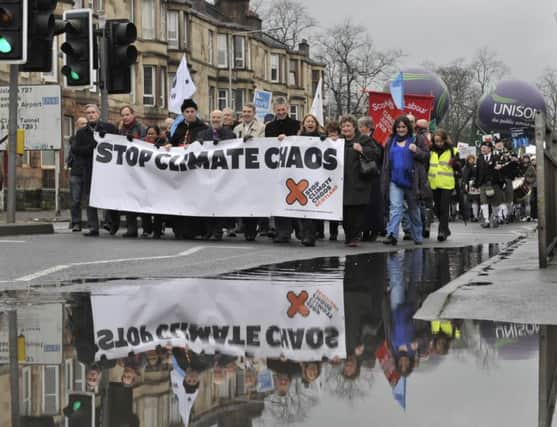Tom Ballantine: Time to ask the climate question


The instruction in the recent Stop Climate Chaos Scotland online election debate was “Ask the climate question”. Large numbers turned up, and logged on, to put questions to Holyrood candidates. The debate covered issues such as the future of oil extraction in Scotland, transport priorities and the need for government, communities and individuals to act.
The shift in perspective was striking. Since the huge climate marches in Scotland and around the world of December last year, and since the agreement on climate action in Paris, there is a growing momentum for action with a question: Will we do enough and in time? The science, worsening weather events, continuing record temperature rises, consequences of inaction – all demand strong action now.
Advertisement
Hide AdAdvertisement
Hide AdThe Paris Agreement, signed by record numbers last month, talks about holding the increase in global temperatures to “well below” 2°c. It confirms that limiting the temperature increase to 1.5°c would “significantly reduce the risks and impacts of climate change” and requires signatories to “pursue efforts” to limit any increase to that.
The UK government climate change committee advice from March dispels any doubt as to the urgency. If global emissions continue at the current rate, the total emissions allowable for a “likely chance of staying below 1.5°c” will be exceeded by “around 2020”. The next four years represent the last, best chance to take critical steps. It has never been more relevant to ask politicians that climate question.
Answers should be forthcoming. In August last year all parties represented at Holyrood committed to making their manifestos “consistent with delivering the ambitions of Scotland’s Climate Change Act”. The parliament passed that act unanimously in 2009 committing Scotland to reducing emissions from 1990 levels by 42 per cent by 2020 and 80 per cent by 2050.
Our Stop Climate Chaos Scotland election manifesto “Securing a low carbon Scotland for 2020 and beyond” sets out key priorities against which voters can measure that commitment – action for energy efficiency and renewable heat for homes; help for people to move from cars to public transport, walking and cycling; using air passenger duty to cut emissions; and an ambitious strategy on saving emissions through the way we use land. We suggest decisions about long-lasting infrastructure should help us to a fossil -fuel-free economy. Scotland should re-inforce its financial support on climate change for people in the developing world. Investment, incentives and regulation across government should be used to help, not hinder, the move to a low carbon future.
The fear at that debate, after Paris, and after missed annual targets in Scotland, is that the next parliament will not do enough. Alongside targets, early funding for climate justice and plentiful renewable energy, we must extend our action.
There is hope as well. The example of what we do in Scotland can have, and has had, a positive impact elsewhere. Just as the rest of the world starts to speed up, it is imperative we do not slow down. The costs of renewable energy technologies continue to fall; the understanding of the economic, security, health and pollution benefits of a green economy continues to rise.
This beautiful planet continues to wait. We need to act now. Future generations will ask their own climate question.
• Tom Ballantine is chair of Stop Climate Chaos Scotland